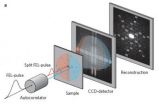Sleep mode: The energy cost of sleep deprivation
2011-01-13
(Press-News.org) The findings show that missing a night of sleep burns roughly 135 calories, the equivalent of two slices of bread or a 225 ml glass of semi-skimmed milk. In terms of physical exertion, this amounts to walking just under two miles. On the flip side, eight hours of sleep saved the same approximate amount of energy.
'While the amount of energy saved during sleep may seem small, it was actually more than we expected,' says Professor Kenneth Wright, lead author of the study and Director of Colorado University's Sleep and Chronobiology Laboratory. 'If one considers the amount of positive energy storage needed to explain the obesity epidemic is 50 calories a day (Hill et al., 2003), the energy savings represented by sleep is physiologically meaningful.'
The tightly controlled study included seven carefully vetted young adult subjects, with the participants required to stay in bed and follow a weight maintenance diet for the entire three-day duration. The first day established baseline data and consisted of a typical 16 hours of wakefulness followed by eight hours of sleep. Days two and three included 40 hours of total sleep deprivation followed by eight hours of recovery sleep.
The findings showed that compared to a typical night of sleep, the amount of energy expended by the subjects during 24 hours of sleep deprivation increased about seven per cent. In contrast, energy expenditure decreased to five per cent during the recovery episode, which included 16 hours of wakefulness (following the sleep deprivation night), then eight hours of recovery sleep.
The study proves there is a direct correlation between the sleep–wake cycle and how the body uses energy. It also demonstrates that sleep deprivation is metabolically costly. 'The function of sleep, especially in humans, is considered one of the most important scientific enigmas,' commented Wright, who hopes the new data will help researchers better understand one piece of the sleep puzzle.
One question arising from the study concerns why humans don't conserve more energy during sleep. 'There are other functions of sleep that are important and cost energy,' explains Wright. 'Some conserved energy may be re-distributed to support vital physiological processes like learning and memory consolidation, immune function, and hormone synthesis and release.'
Wright is also quick to caution that energy expenditure during sleep deprivation is neither a safe nor effective strategy for weight loss as other studies have shown that chronic sleep deprivation is associated with impaired cognition and weight gain. He hopes recently initiated research in his lab will shed further light on this relationship and generate useful findings for 'at risk' members of the public.
INFORMATION: END
ELSE PRESS RELEASES FROM THIS DATE:
2011-01-13
Lasers have revolutionized the communications and medical industries. They focus light to zap tumors and send digital TV signals and telephone communications around the world.
But the physical length of an ordinary laser cannot be less than one half of the wavelength of its light, which limits its application in many industries. Now the Spaser, a new invention developed in part by Tel Aviv University, can be as small as needed to fuel nano-technologies of the future.
Prof. David Bergman of Tel Aviv University's Department of Physics and Astronomy developed and patented ...
2011-01-13
Brussels - Adrenaline, the hormone that prepares our body to fight or flight, acts on a hyperdynamic receptor. This molecule switches so fast between several positions, that it was impossible to image it. Until now. Scientists, including Jan Steyaert of VIB and the Vrije Universiteit Brussel in Belgium, and colleagues from Stanford University in the US, have "frozen the molecule in action" using Xaperones™, tiny, stable antibodies developed by the Brussels scientists. The Xaperones™ bind like a key to a lock, holding the adrenaline receptor in one position -- the on position. ...
2011-01-13
As H1N1 'Swine Flu' returns to the national headlines a new research paper reveals the key lessons about the origins of the 2009 pandemic. The paper, published today in BioEssays, reveals how the pandemic challenges the traditional understanding of 'antigenic shift' , given that the virus emerged from an existing influenza subtype.
"H1N1 emerged in February 2009 in Mexico and swept around the globe within 6 months." said Professor Hans Dieter Klenk from Philipps-Universität Marburg. "The conventional ideal is that pandemics are fuelled by new strands which emerge in the ...
2011-01-13
Major power outages are fairly infrequent, but when they happen they can result in billions of dollars in costs – and even contribute to fatalities. Now research from North Carolina State University has led to the development of an approach by which high-resolution power-system measurements, also referred to as Synchrophasors, can be efficiently used to develop reliable models of large power systems, which would help us keep an eye on their health.
Synchrophasors are real-time measurements of voltages and currents that provide a very high-resolution view of various complex ...
2011-01-13
Humans are notoriously bad at predicting their future happiness. A new study published in Psychological Science, a journal of the Association for Psychological Science, suggests that part of the reason for these mispredictions lies in failing to recognize the key role played by one's own personality when determining future emotional reactions.
The new evidence comes from Jordi Quoidbach, a psychological scientist at the University of Liege, Belgium. Quoidbach and Elizabeth Dunn, his collaborator at the University of British Columbia, found that our natural sunny or negative ...
2011-01-13
When we catch a cold, the immune system steps in to defend us. This is a well-known biological fact, but is difficult to observe directly. Processes at a molecular level are not only miniscule, they are often extremely fast, and therefore difficult to capture in action. Scientists at Helmholtz-Zentrum Berlin für Materialien und Energie (HZB) and the Technische Uni-versität Berlin (TUB) now present a method that takes us a good step towards producing a "molecular movie". They can record two pictures at such a short time interval that it will soon be possible to observe molecules ...
2011-01-13
"Snoring, sleep apnoea, and obesity-related respiratory difficulties are fairly common disorders that affect a large proportion of the population," according to Poul Jennum, Professor of Clinical Neurophysiology at the Center for Healthy Ageing at the University of Copenhagen Faculty of Health Sciences. He is head of the Danish Centre for Sleep Medicine, Glostrup Hospital, which treats patients from all over the country.
"Previous studies show that these disorders seriously affect quality of life, and our new studies show that people who snore violently, and particularly ...
2011-01-13
If you want to lose the kilos you've put on over Christmas, you may be interested in knowing that the hormones related to appetite play an important role in your likelihood of regaining weight after dieting. A new study confirms that people with the highest levels of leptin and lowest levels of ghrelin are more likely to put the centimetres they lost back on again.
Doctors often have to deal with patients who, after sticking to a slimming diet, have regained the kilos lost in just a short time – or weigh even more than they did before they started the diet. This is called ...
2011-01-13
Mice previously exposed to traumatic situations demonstrate a more persistent memory of fear conditioning - acquired by associating an acoustic stimulus with an aversive stimulus - and lack the ability to inhibit this fear. This phenomenon is similar to that of people who suffer from Post-Traumatic Stress Disorder (PTSD), an anxiety disorder which appears after being exposed to highly traumatic situations, such as a violent attack, a natural disaster or physical abuse.
In the study researchers verified that the 7,8-Dihydroxyflavone injected into mice previously subjected ...
2011-01-13
Looking deep into space, and literally peering back in time, is like experiencing the universe in a house of mirrors where everything is distorted through a phenomenon called gravitational lensing. Gravitational lensing occurs when light from a distant object is distorted by a massive object that is in the foreground. Astronomers have started to apply this concept in a new way to determine the number of very distant galaxies and to measure dark matter in the universe. Though recent progress has been made in extending the use of gravitational lensing, a letter published ...
LAST 30 PRESS RELEASES:
[Press-News.org] Sleep mode: The energy cost of sleep deprivation


